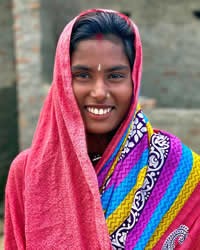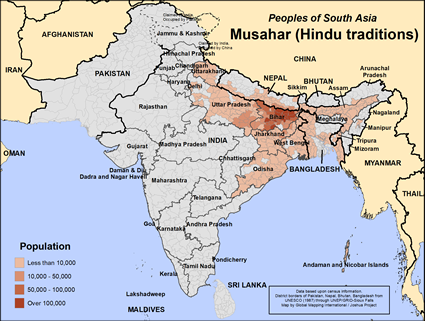The Musahar are at the very lowest stratum of Indian society. The Musahar are considered one of the lowest of the low class communities within India and suffer tremendously from their status in society. Their name is derived from two words meaning "rat catcher" and is likely attributed to them for their tendency to eat rodents in times of dire need.
The Musahar live mainly in Bihar and Uttar Pradesh, but also in other north Indian states such as Jharkhand, Odisha and West Bengal.
Land ownership is rare, and most will work as agricultural laborers, day laborers or forest and fishing. The women also work in agriculture or other unskilled labor such as stitching leaf-plates.
They don't value education and literacy is extremely low. Often they drop out at the primary level due to social or economic factors. Modern development programs have had little impact on them as few if any of the sparsely allocated resources designated for them ever reach them in their need. Many times their wages are paid in crops and they trade in the market place through barter.
They have large families and live with several generations in the same household. A Musahar village is almost always filled with children. Though they will frequently speak Hindi, the local trade language, they will speak Angika or Awadhi at home.
The Musahar are not caste-Hindus but are from an animistic Hinduism or popular Hinduism background. Traditionally they follow their tribal faith and will worship their family deity and the village deity, as well as the gods of the wider Hindu faith.
The Musahar are very receptive to the gospel and a move of Christ is beginning among them. A significant number of Musahar are following Christ and village house churches are being formed with Musahar leadership. A network of agencies and churches are working among the Musahar. The Musahar are in the process of being reached.
Because of their extreme poverty, they live far from towns and cities which have proper health care. Nor do they have the capacity to travel to avail themselves of these facilities. The result is a desperate health care situation. Child mortality and maternal mortality are high, and the life span is short which is exacerbated by high rates of alcoholism among the male population.
Much of their condition is a result of their low position in the caste hierarchy. They are given low status and treated with disdain by all other sections of society. Any attempts at economic advancement will be taken away from them or destroyed and they have little or no capacity to retain property rights. Their constitutional rights of education and food subsidies are routinely denied through corruption and caste based policies. They are powerless and voiceless, unable to change their situation without outside help. Sadly, many Musahar women are kidnapped or sold into prostitution in the major metropolitan cities. Without recourse this becomes their new life, forced to suffer in silence.
Pray the Musahar would see they can enjoy abundant life if they put their trust in Jesus Christ.
Pray for the Lord to intervene in their families, calling people to his side and blessing them in every way.
Pray for loving workers to stay with them until they have disciples who make other disciples.
Pray for their hearts to be drawn to the Lord of lords.
Pray for a church planting movement to thrive in their communities.
Scripture Prayers for the Musahar (Hindu traditions) in India.
GSCC, SD Ponraj, Copyrighted © Used with permission
| Profile Source: Joshua Project |












